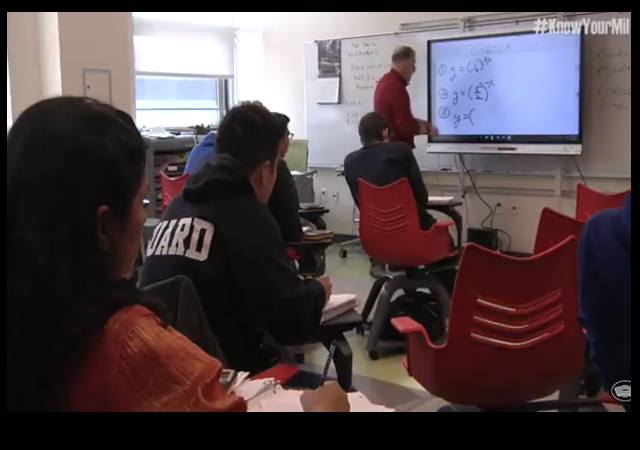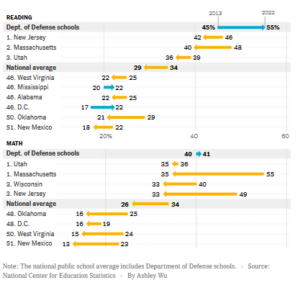The Pentagon Gets High Marks in New Report, for Running Schools that Actually Educate Children
Serving 66,000 kids of service members and DoD employees aged five though 18, the system last year outperformed all 50 states on reading and math scores.

The New York Times recently published an expose detailing how the network of schools presided over by the Pentagon has consistently outperformed public schools in this country, even with interruptions wrought by the pandemic.
On the National Assessment of Educational Progress, a federal exam that is considered the gold standard for comparing states and large districts, the Defense Department’s schools outscored every jurisdiction in math and reading last year and managed to avoid widespread pandemic losses.
Their schools had the highest outcomes in the country for Black and Hispanic students, whose eighth-grade reading scores outpaced national averages for white students.
Eighth graders whose parents only graduated from high school — suggesting lower family incomes, on average — performed as well in reading as students nationally whose parents were college graduates.
The schools reopened relatively quickly during the pandemic, but last year’s results were no fluke.
While the achievement of U.S. students overall has stagnated over the last decade, the military’s schools have made gains on the national test since 2013. And even as the country’s lowest-performing students — in the bottom 25th percentile — have slipped further behind, the Defense Department’s lowest-performing students have improved in fourth-grade math and eighth-grade reading.
“If the Department of Defense schools were a state, we would all be traveling there to figure out what’s going on,” said Martin West, an education professor at Harvard who serves on the national exam’s governing board.
The Department of Defense Education Activity (DoDEA) administers 160 schools, with the majority located on one of the country’s nearly 500 military bases. Review the test results, the numbers are truly astonishing and experts indicate the results can be attributed, in part, to old-fashioned military discipline.
Serving 66,000 kids of service members and DoD employees aged five though 18, the system last year outperformed all 50 states on reading and math scores from eighth and fourth graders – both key markers in measuring students’ progress.
Released by the National Center for Education Statistic, the test scores showed how 55 percent of DoD eighth graders have reading scores considered proficient – a full 21 percent more than the national average.
In terms of Math, more than 41 percent of middle schoolers in grade eight scored above the grade-level marker – eight percent more than the number representing all Americans.
In comments to The New York Times, several sociologists credited the score discrepancy on standards set by the military-run machine, which they said has created a disciplined classroom culture.
While I am not a member of the military, I come from a long line whose members have served in the American military, starting with Revolutionary War General Israel Putnam (who famously said, “Don’t shoot until you see the whites of their eyes!”). We have had a member in the military almost continuously since then, now including my son. The impact of discipline, and striving for excellent, that is an inherent part of that culture cannot be understated.
The New York Times, however, offers these explanations for the success of Department of Defense schools:
- They are well-funded, with well-stocked classrooms, including books and art supplies. Many public school teachers have to pay out-of-pocket for supplies.
- They’re integrated. Unlike Pentagon schools, public schools are often divided along socio-economic and racial lines with unequal funding, which widens achievement gaps along both racial and economic lines. There’s a $23 billion funding gap between districts serving mostly white students and districts serving mostly students of color.
- Their teachers are well paid. The Pentagon’s budget allows schools to spend more money per student and pay teachers more, which helps retain teachers, The Times reports.
- Students’ homes are stable. With at least one parent working for the military, families get access to housing and health care on the base. When parents and kids aren’t worried about basic needs being met, it’s easier for students to focus on learning.
I would simply note that more money does not automatically equate to better education for children.
Specifically, on 4th and 8th grade National Assessment of Educational Progress (NAEP) scores, often called “the nation’s report card,” there was no clear correlation between spending increases and test improvements from 2003 to 2015. As my colleague at the Mackinac Center Ben DeGrow notes, “Six of the top 10 states that improved their average test scores on the NAEP the most were among the 11 states with the smallest funding growth.”
This isn’t too surprising. A 2016 report analyzing school districts in Michigan found similar results. The analysis tracked years of data of spending by individual schools and compared it to 28 different measures of achievement in these schools. On only one measure did more spending correlate statistically with a better result, but, even then, the gains from extra spending were miniscule.
I would argue that among the contributing factors for the success of Department of Defense schools is that there are fewer social justice distractions, such as one ones that can be found at public schools.
A San Francisco area drag queen named Nicole Jizzington, or “Nikki Jizz” for short, allegedly performed for a group of middle schoolers Tuesday.
“I performed at a this middle school and had them kids losing it,” the drag performer allegedly posted in a tweet containing a video of the performance which occurred at Aspire Richmond California College Preparatory Academy in Richmond, California.
The kids at the Department of Defense are also probably not spending too much time on exploring a potential rainbow of genders.
A total of 768 public high school students in Carroll County, about 18% of those enrolled in health classes, have opted out of the Family Life and Human Sexuality Unit developed by the Maryland State Department of Education this school year, and instead chose to enroll in an alternative framework developed locally that eliminates discussion of gender identity and gender expression.
Military families typically adhere to more traditional social values and are willing to discipline their children, so their contribution to these outstanding numbers must also be acknowledged. When the focus is on reading, writing and arithmetic . . . reading, writing, and arithmetic will be learned.
There are valuable lessons to be had here, for those who are willing to consider all the data.
Donations tax deductible
to the full extent allowed by law.









Comments
Interesting. I didn’t know the DOD ran schools.
It does show that a school that concentrates on schooling gets results.
Yes, I often pass one while traveling through Travis AFB in Florida. It makes me proud that the military and their families truly care about their choldren.
Actually, most DoD run schools are overseas. Most schools on base are contracted out to the local school district.
Most state-side schools on base are contracted out to the local school district.
[and edit function is needed on this site]
There are two things that matter, not the listed nonsense.
Discipline at home with parents, at least, paying lip service to the importance of education.
Discipline at school where the distraction students aren’t allowed to be a massive disruption.
Did the Times article have a note of panic to it? Let’s hope the military schools can keep going with the 5 Rs and not be upended by politicians.
Does this prove that pornography for grade school students is “stimulative” to learning?
https://www.foxnews.com/media/pentagon-schools-infested-shocking-pornographic-material-military-kids-time-send-pic
Pentagon doctors claim 7-year-olds can make decisions to be injected with hormones, puberty suppressants
The DoD doctors claimed 7-year-olds are capable of ‘medical decision-making’
https://www.foxnews.com/media/pentagon-doctors-claim-7-year-olds-can-make-decisions-injected-hormones-puberty-suppressants
Stay out of the U.S. military.
I am pretty sure that as a result of this report that a “Joint Command for Academic DEI” will be created to punish the staff who accomplished this and bring the scores down below the lowest state and keep them there.
Subotai Bahadur
You know, when the Department of Defense actually does something that is good, you should acknowledge it. and support it. When all you do is mock it and disparage it, you are only contributing to the problem.
Actually, I am mocking the Leftist politicians who find the idea of academic excellence something to be destroyed. It is neither “woke” or “politically correct” in their view. By proving that excellence is possible, it discredits the ruling ideology.
Subotai Bahadur
If memory serves, in at least “the old days” a military parent had personal and direct responsibility for his child’s actions. If the student caused a problem, the parent also suffered sanctions (professionally and otherwise). That meant that classrooms were more orderly and the children had greater overall supervision on their actions, both in and out of school.
In general yes that’s still true, especially in overseas areas. Each service member is responsible for the conduct of their dependents. So if PVT Snuffy’s wife is arrested for shoplifting the PX and they are in Germany she is very likely to be involuntarily sent back to the US. Same if Major Smith’s kid is acting out, they either get it under control or that dependant gets sent back the States if overseas and expelled if in the US. Every Service member is the sponsor for their dependant Spouse and children which isn’t a check the block exercise, it has real responsibilities and failing to meet them has real consequences.
“Students’ homes are stable. With at least one parent working for the military, families get access to housing and health care on the base. When parents and kids aren’t worried about basic needs being met, it’s easier for students to focus on learning.”
It’s this but more, much more. Military families have a different mindset, are more disciplined. But I suspect the key factor is having two parents, Even if one is deployed halfway around the world that parent remains a part of the family unit.
Having been educated through 12 years of Catholic schools with classes of 50 to 70 students I can testify to the success of discipline in the classroom backed up by parental support. No matter the home situation we could all read, write, behave, and respect others.
Students will rise to the level of expectations set for them when those expectations are ruthlessly enforced. That’s the 80% solution. Of the 20% of Students remaining some are too far gone and can’t be reached at the moment, maybe later when their stunted emotional maturity has grown but not now and we shouldn’t expend excess resources on them b/c there ain’t any excess.
Others in that 20% can be reached. A few by the simple example made of others being expelled or arrested. A few others could be saved by society growing a pair and removing these kids from their single mother homes with an inattentive or indifferent at best and a self destructive, narcissistic unfit Parent at worst. We must stop coddling and making excuses for students, parents and educators who choose to fail by rejecting the basic elements of success.
It is a forced feedback loop within families more disciplined than the average family. Dad/Mom go to work; hear from fellow military employees how poorly their kids are doing; kids get an earful from parents when they return home.
The retards at the NYT have no idea what they are talking about. Of course lefties rarely understand human nature or human relationships in general.
Well, duh! Military parents:
1. Know the value of education.
2. Take discipline seriously.
3. Have high expectations for their children.
So, of course, “their schools” will do better!